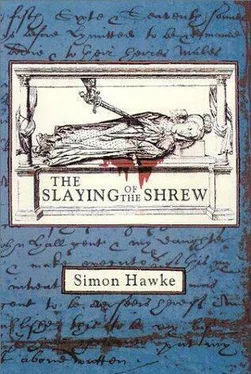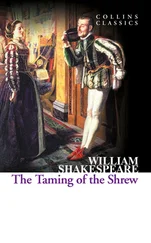Simon Hawke - The Slaying Of The Shrew
Здесь есть возможность читать онлайн «Simon Hawke - The Slaying Of The Shrew» весь текст электронной книги совершенно бесплатно (целиком полную версию без сокращений). В некоторых случаях можно слушать аудио, скачать через торрент в формате fb2 и присутствует краткое содержание. Жанр: Исторический детектив, на английском языке. Описание произведения, (предисловие) а так же отзывы посетителей доступны на портале библиотеки ЛибКат.
- Название:The Slaying Of The Shrew
- Автор:
- Жанр:
- Год:неизвестен
- ISBN:нет данных
- Рейтинг книги:5 / 5. Голосов: 1
-
Избранное:Добавить в избранное
- Отзывы:
-
Ваша оценка:
- 100
- 1
- 2
- 3
- 4
- 5
The Slaying Of The Shrew: краткое содержание, описание и аннотация
Предлагаем к чтению аннотацию, описание, краткое содержание или предисловие (зависит от того, что написал сам автор книги «The Slaying Of The Shrew»). Если вы не нашли необходимую информацию о книге — напишите в комментариях, мы постараемся отыскать её.
The Slaying Of The Shrew — читать онлайн бесплатно полную книгу (весь текст) целиком
Ниже представлен текст книги, разбитый по страницам. Система сохранения места последней прочитанной страницы, позволяет с удобством читать онлайн бесплатно книгу «The Slaying Of The Shrew», без необходимости каждый раз заново искать на чём Вы остановились. Поставьте закладку, и сможете в любой момент перейти на страницу, на которой закончили чтение.
Интервал:
Закладка:
It worried him throughout the funeral ceremony, which was mercifully short, doubtless because Godfrey Middleton would have found it unbearable to draw it out into an elaborate ritual, as he had intended to do with Catherine’s wedding. The musicians who had been engaged to play for the wedding now played for the funeral instead, offering up sweet and solemn tunes which they played upon lutes, recorders, citterns, sackbutts, harps and psaltries, coaxing more than a few tears from the assembled guests, especially the women, many of whom joined in to sing several psalms for the procession to the family vault.
As it was a newly built estate, the vault was new as well, a small yet stately stone mausoleum which contained but one coffin, that of Catherine’s mother. Now Catherine would sleep beside her, laid out in her wedding dress upon the slab until her own coffin could be prepared. It would doubtless be speedily arranged upon the morrow, if Middleton or, more likely, his steward did not already have a carpenter at the estate busily engaged upon the task. The procession gathered in the front courtyard of the house and then slowly and solemnly made its way across the grounds, in the opposite direction from the fair’s pavillions, down a path that led along the riverside and through the woods to where the vault stood in a small clearing, surrounded by a stone wall with an iron gate set into it. It would, thought Smythe, be a very peaceful place to rest.
His thoughts and his attention were less upon the funeral, however, than upon those in attendance, in particular a certain few who had been the subject of discussion earlier between Godfrey Middle-ton, Sir William, and himself. Because of what he had overheard, their discussion had centered upon Blanche Middleton’s suitors, in particular those who were not well known to either Middleton or Worley. Given that Blanche was quite a sultry beauty, and with a very wealthy father, there seemed to be no shortage of eager suitors for her hand in marriage. However, a good number of them were easily eliminated from consideration as suspects due to either Middleton or Worley being well acquainted with their families, if not with the young men themselves. That still left three or four who seemed quite worthy of suspicion.
One such was young Andrew Braithwaite, a baron’s son who hailed from Lancashire. Or so he claimed. Middleton knew nothing of him and Worley had no knowledge of him, either. However, that did not necessarily mean Braithwaite was not who he said he was. Not all the members of England ’s nobility were regulars at court or sat among their peers in the House of Lords; some never even came to London. Consequently, they did not necessarily all know one another. Sir William had explained, primarily for Smythe’s benefit, that presently there were three degrees of nobility in England, those of baron, viscount, and earl, in descending order. A duke would have been above a baron, of course, but at present, no one held that tide.
As a country commoner with little formal education, Smythe did not know a great deal about the nobility, nor had he learned very much more since he came to London. He knew that a noble was created by the sovereign through a patent bearing the Great Seal of England and the title of that noble was thereupon passed down through the eldest son. He also knew that bishops, equal to the nobility in rank, were likewise appointed by the sovereign, and their offices were not hereditary. Below them were knights and gentlemen, with knighthood bestowed for special service or as a mark of favor by either the sovereign or a deputy empowered to act in the sovereign’s name, such as a general or an admiral in time of war. As with a bishopric, a knighthood was not hereditary, and a gentleman could only properly call himself a gentleman when the College of Heralds saw fit to award him with a coat of arms. And that, essentially, was the limit of Smythe’s knowledge.
Sir William was not sure exactly how many nobles there were in England at the present time. There were a dozen earls or so, he thought, a few viscounts, and probably more barons than any other degree of nobility, perhaps thirty or more. There were people at court, he said, who paid far more attention to that sort of thing than he did. Her Majesty, for one, would have more knowledge at her fingertips, as would her ministers and any of the heralds, for among their varied functions was the granting of coats of arms to gentlemen and the preservation of all records of England’s noble families.
The heralds took their duties very seriously, Sir William had explained. Organized into a college, they were under the authority of the Earl Marshal, who was a court official. The three senior heralds held the tides of Garter King at Arms, Clarenceaux King at Arms, and Norry King at Arms. Below them were the heralds of York, Somerset, Lancaster, Richmond, Chester, and Windsor, with four pursuivants below them bearing the colorful titles of Rouge Dragon, Blue Mantle, Portcullis, and Rouge Croix. And while Her Majesty might conceivably lose track of a noble or two, Sir William said, especially if he were not in regular attendance at her court, it was unthinkable that a herald should do so, for one of their most important duties was to examine the claims of anyone, including foreign visitors, who claimed to be of noble or gentle birth. Regretably, there were no heralds handy, and with the royal court away from London, a bold imposter might easily believe that he could pass himself off as a nobleman and get away with it, at least for a while.
Young Braithwaite seemed modest to a fault, a quality which had initially impressed Middleton quite favorably, but that now made him suspicious. Braithwaite’s apparent reticence in discussing his family had at first seemed like modest self-effacement, but now, given what Smythe had overheard from the two mysterious plotters, it could readily be perceived as guile. Moreover, there was something rather rakish about young Andrew Braithwaite, despite his outward display of manners. He was approximately the same age as Smythe, chestnut-haired, blue-eyed, clean-shaven and handsome in a rugged, provincial sort of way, but there was something in his manner that Smythe did not quite care for. He had a way of strutting when he walked, a sort of loose-hipped, rolling swagger that did not quite seem to match his seeming outward modesty. It was a small thing, perhaps, but it rubbed Smythe the wrong way.
The elder Braithwaite was not in attendance, which might have cast some doubt on the younger Braithwaite as a suspect, for the plan that Smythe had overheard involved one of the two men posing as the father. However, as Worley had pointed out, knowing that someone had overheard them, even if they did not know precisely who it was, could easily have brought about a change in the two scoundrels’ plans. If they knew that someone might expect a nobleman and his son to be imposters, then it was possible that they might have decided to withhold the father, so to speak, and just advance the son, thus hoping to confuse anyone looking for a father and a son, while keeping the other man in reserve, standing by to perform whatever unsavory task might be required of him. That made sense to Smythe, therefore he did not dismiss the strutting Andrew Braithwaite out of hand. Nor did he miss the fact that Blanche very much seemed to enjoy the attention he was paying to her. But then, at the same time, she seemed more than willing to encourage the attentions of the chevalier Phillipe Dubois, as well.
Here, thought Smythe, was a different kettle of fish entirely, and he did not much care for how it smelled. One of the things he had discovered about the upper classes since coming to the city was that artifice was something that they often elevated to an art. They went to extraordinary lengths and expense to out-peacock one another, and an exaggerated sense of flamboyance-or at least so it seemed to Smythe, with his plain, country sensibilities-was usually the order of the day not only in fashion, but also in behavior. In this respect, Dubois excelled even in this company. True, the young Frenchman was not required, on this occasion, to compete with the more socially prominent and consequently more fashionably adept courtiers who were away from London with Her Majesty, but Worley had observed in passing, after only a brief glimpse of him, that Phillipe Dubois would have doubtless held his own with them, as well.
Читать дальшеИнтервал:
Закладка:
Похожие книги на «The Slaying Of The Shrew»
Представляем Вашему вниманию похожие книги на «The Slaying Of The Shrew» списком для выбора. Мы отобрали схожую по названию и смыслу литературу в надежде предоставить читателям больше вариантов отыскать новые, интересные, ещё непрочитанные произведения.
Обсуждение, отзывы о книге «The Slaying Of The Shrew» и просто собственные мнения читателей. Оставьте ваши комментарии, напишите, что Вы думаете о произведении, его смысле или главных героях. Укажите что конкретно понравилось, а что нет, и почему Вы так считаете.












